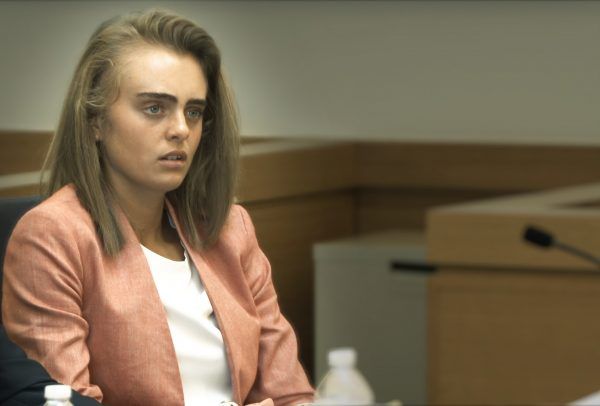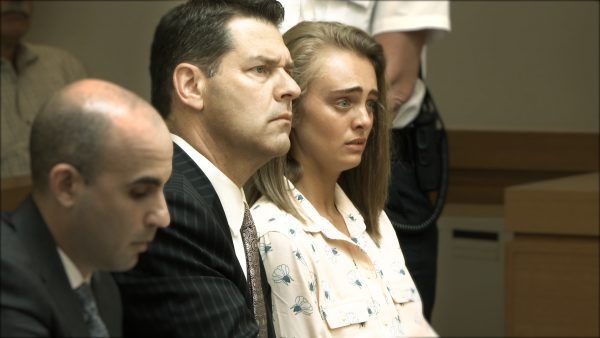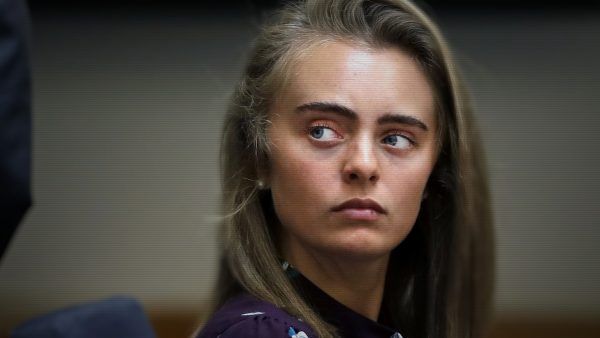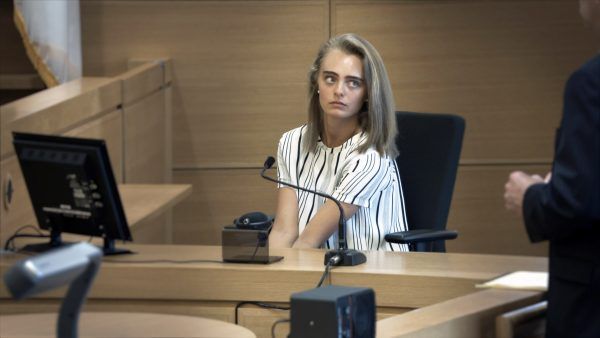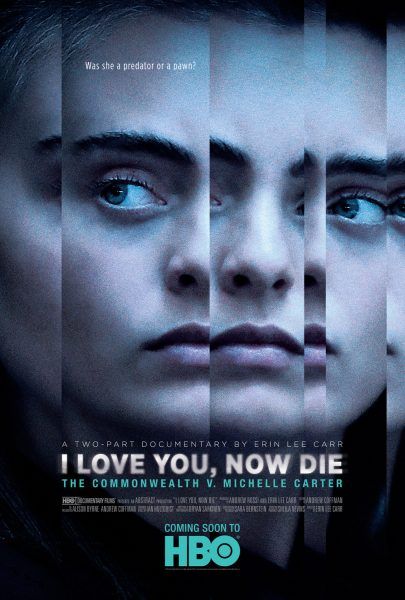By now, you've probably heard about the case of Michelle Carter. Carter was accused at age 17 and tried for the involuntary manslaughter of her boyfriend, 18-year-old Conrad Roy III, by allegedly convincing himself to commit suicide via her text messages. To most people, the case seems fairly clear cut on its surface. A "normal" human being sees a person who is threatening suicide and intervenes to prevent harm. Michelle, on the other hand, supported and encouraged Conrad's desire to commit suicide. Therefore, Michelle must be a monster. But when you watch Erin Lee Carr's documentary I Love You, Now Die: The Commonwealth vs. Michelle Carter, you come away with a more complex and more heartbreaking picture that offers no easy answers. I haven't been able to shake it.
In 2014, Conrad Roy committed suicide via acute carbon monoxide poisoning by rigging a generator to his car with a length of hose. However, Roy's death took on an even darker connotation when detectives unearthed 60,000 text messages between Roy and his girlfriend Michelle Carter. Roy and Carter only met about five times and lived in different towns, but had an intense romantic relationship via text message. Carr divides her story into "The Prosecution" and "The Defense", and The Prosecution paints a damning picture of Carter as a sadistic and lonely young woman who wanted her boyfriend to die because it would bring her attention. However, as the documentary unfolds, it's clear that there was far more going on between Roy and Carter than just a young woman constantly prodding her boyfriend to commit suicide.
Conrad Roy III is dead and he shouldn't be. He was young with his whole life ahead of him and a family that loved him. The texts with Carter offer an avenue of blame. If we blame Carter and can point to text messages where she encouraged Conrad to commit suicide, then she is to blame and justice can be served. Now there's a narrative, and it's one our society clings too far too often and too quickly: it was the evil woman who used her powers of seduction and coercion to get an innocent young man to kill himself. If you're not careful, she or women like her will get you to kill yourself via text message as well.
But when you start spending time with the case and talking to people who have looked through not just the text messages but spoken to Carter's associates and examined her social media presence, a more nuanced and difficult portrait emerges. When you look the case holistically, you can only see layers upon layers of tragedy. The immediate tragedy is that these two mentally ill teenagers found each other and fed each other's worse impulses. Roy needed an audience for his suicidal tendencies. Carter needed the love and adoration that felt in tune with the popular media she consumed like The Fault in Our Stars and Glee.
When you start pulling back you see a system of failures. Both Roy and Carter were on anti-depressant medication, but where are their psychiatrists in all of this? Roy's parents say they just assumed Carter was a regular girlfriend (Carter and her parents declined to be interviewed for the documentary), but if he's a minor, why is Carter responsible but not them? Or why aren't Carter's parents responsible for their daughter? The burden appears to lie with Carter because her actions were apparently malignant rather than simply negligent, but this in turn reveals even greater failings on the part of our society.
As the documentary wisely points out, we have a long tradition of blaming women, especially when it comes to the mental illnesses of others. They are deemed "witches" and the term "bewitched" means "under control." This perception is a dark and insidious twisting of the already problematic perception that women must always bear the role of nurturer and caretaker, and always reducing them to wife and mother. To fail in this role is "criminal" and so if a man is a victim of his emotions, it's because the emotional caretaker, a woman, did not live up to her "duty."
Now you can say that's nonsense, and that any decent person would have worked to prevent someone they loved from inflicting self-harm. But did you know that Roy specifically told Carter not to tell his parents or the authorities about his suicidal tendencies? What then? Put yourself in Carter's shoes: you're an insecure teenage girl who frequently feels like she's not included in any friend group. Here's a guy who pays attention to you and says he loves you, but his love is conditional on you supporting his suicidal ideation. The entire case rests on seeing Michelle Carter as a well-adjusted young woman, but the evidence doesn't support that, and even if she was, the mental wellbeing and safety of her boyfriend is an enormous burden to put on a 17-year-old.
I will note, however, that tragedy does not absolve guilt. Any crime of passion could be filed under the label of "tragedy." If a mentally ill person stabs you with a knife, the mentally ill person still has to go into an institution of some sort. The problem with this analogy is that it removes all agency from Roy, whose behavior comes perilously close to the abusive boyfriend who warns, "If you leave me, I'll kill myself." The Commonwealth's case rests on the belief that because Carter had text messages spurring Roy on, he would be alive if not for her. There was a time when he got out of his car and said he was scared to continue, but she reportedly told him to get back in even though there are no text messages to support this other than a self-flagellation text from Carter to a friend several weeks later. As the defense's psychiatrist points out, if Carter is deemed an unreliable narrator of her own story, why do we choose to believe her in some moments and not others? And the answer seems to be, "Because we need to blame somebody."
The death of Conrad Roy III is undoubtedly very sad. As a child of divorce who also wrestled with deep depression and even suicidal ideation in high school, I should sympathize with him and his plight. And yet by the end, I couldn't help but feel for Michelle Carter, whose own diagnoses and age were put second to Roy's. The question I can't answer is why a 17-year-old girl should have to be responsible for the mental state of her boyfriend. At the very least, by the end of the documentary, it's harder to believe that Carter acted with malice and that the simplistic narrative that emerged in the media failed to grasp the nuances of her relationship with Roy.
Tragedy doesn't necessarily abdicate responsibility or guilt, but in the case of Conrad Roy's suicide, there seems to be plenty of responsibility and guilt to go around, but it was laid entirely at the feet of Michelle Carter. Although there are some directorial decisions I disagree with (setting the opening credits in a sea of fumes seems particularly in bad taste), I think Carr found a far more captivating and difficult story than the headlines would have led us to believe. I Love You, Now Die shows the comfort of having a villain, but the reality of Carter and Roy's story shows only victims.
Rating: A-


